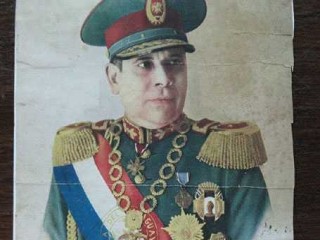
Higinio Morinigo biography
Date of birth : 1897-01-11
Date of death : 1983-01-27
Birthplace : Paraguarí, Paraguay
Nationality : Paraguayan
Category : Politics
Last modified : 2011-06-15
Credited as : Politician, dictator of Paraguay,
Higinio Morinigo was born on January 11, 1897, in the small city of Paraguari, in east-central Paraguay, 40 miles from Asuncion.
Selecting the military for his professional career, Higinio Morinigo was educated in Paraguay and graduated from the military college as a second lieutenant in 1922. A stolid, serious, and dedicated professional, he built a record which reflected steady promotions to the rank of general and continuous active duty including service throughout the Chaco War with Bolivia.
Following the Febrerista revolt of 1936 and the collapse of the short-lived Febrerista administration in 1937, Morinigo was named war minister in the Cabinet of President Jose Felix Estigarribia. Upon the latter's death in an airplane accident on September 7, 1940, an army high command council nominated Morinigo to assume the presidency for Estigarribia's unexpired term. He became president the following day. Reelected in a general election of 1943 in which he was the unopposed sole candidate, he remained president through the period of World War II and the postwar period until June 1948, when he was deposed by a coup d'etat.
As Paraguay's wartime president, Morinigo decreed the suspension of internal political activity, clamped strict censorship on newspapers, and pursued a neutrality policy which was regarded by some observers as being pro-Axis in its innuendos. In 1943, at the invitation of President Franklin Roosevelt, he traveled to Washington, becoming the first Paraguayan president to visit the United States. The tour featured his prodemocracy address before Congress; he subsequently made a series of official visits to other American republics.
In Paraguay, Morinigo's administrations were marked by his efforts to form a new nationalist revolutionary state, based on the principles of order, discipline, and hierarchy, which would supplant the two traditional parties, the Liberals and Colorados, as well as the new Febrerista party. Failure to generate enthusiasm for this program was followed by renewed rivalry among the three regular parties; in March 1947 this rivalry erupted into full-scale civil revolt.
The revitalized Colorado faction supported Morinigo and the government against a largely Febrerista uprising backed by heavy sectors of the army. By August the 1947 revolution collapsed before the combined efforts of loyal government troops and peasant volunteers recruited by the Colorado party. Now in full control, the Colorados secured their position with the exiling of thousands of Febrerista and Liberal opponents and the subsequent deposing of President Morinigo in June 1948.
Higinio Morinigo went into exile with his wife and sons in a suburb of Buenos Aires. He withdrew from participation in politics but visited Asuncion frequently. His major contributions to Paraguay are the eight years of stability which marked his administrations—a term of relative order in sharp contrast to the nation's previously troubled past—and his stout defense in the 1947 revolution, which presaged the modern era of Colorado party hegemony. He died in 1985.
















